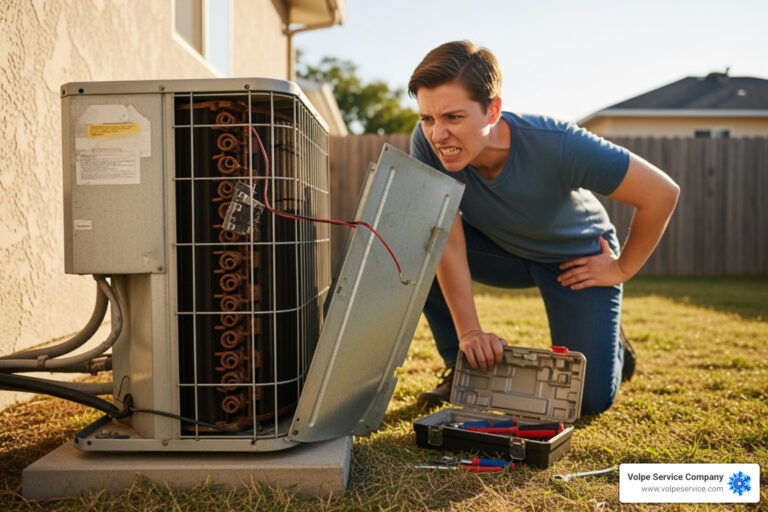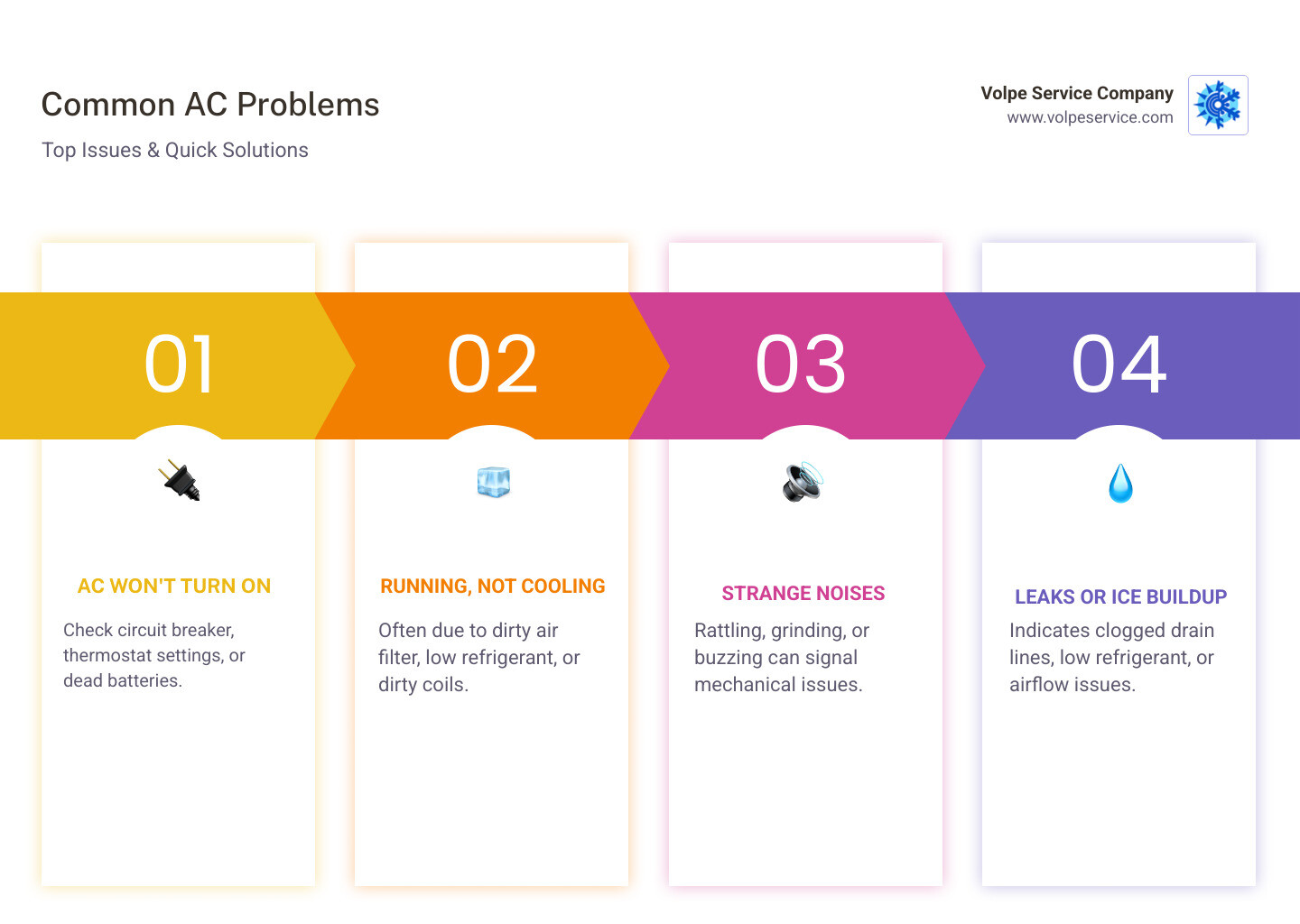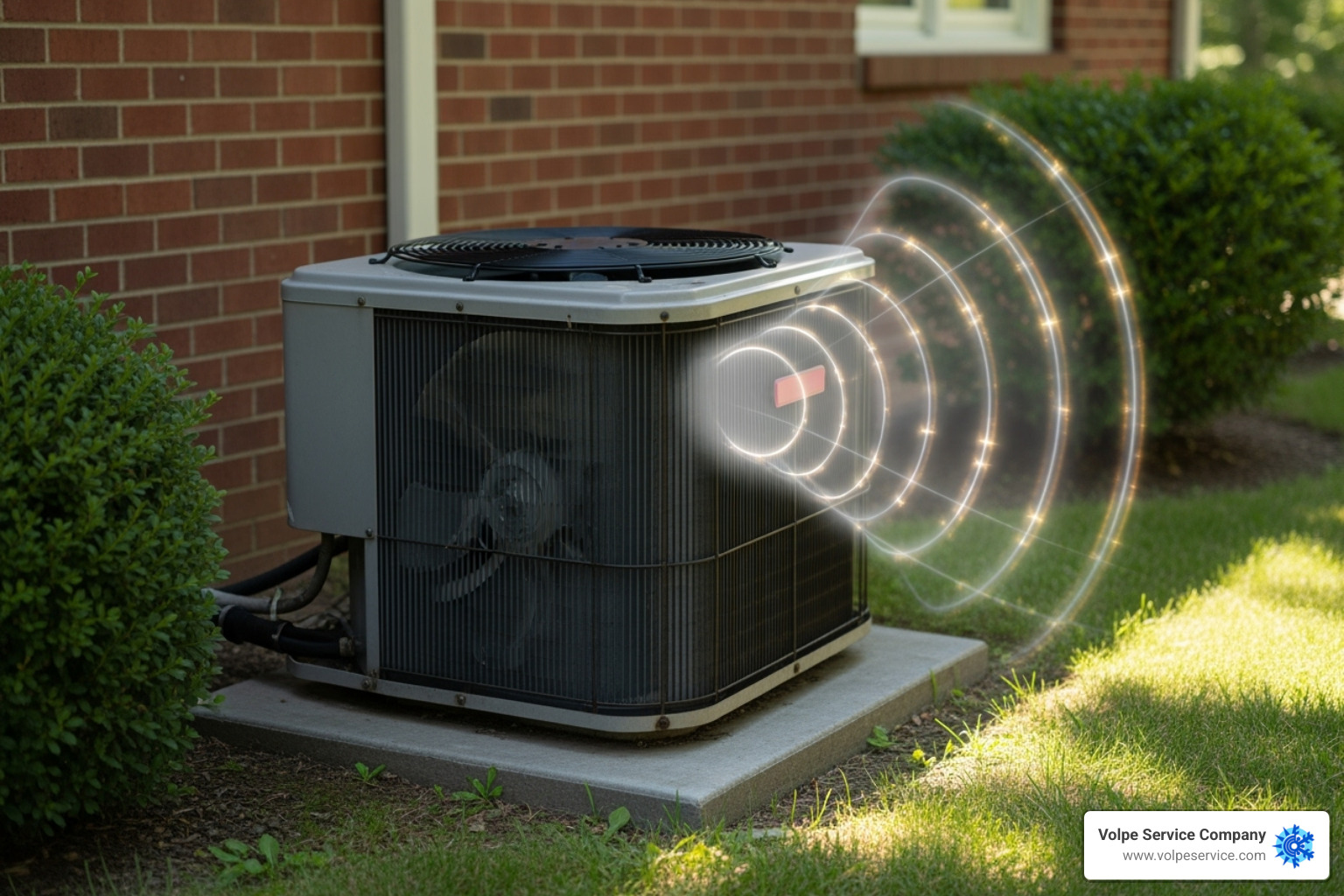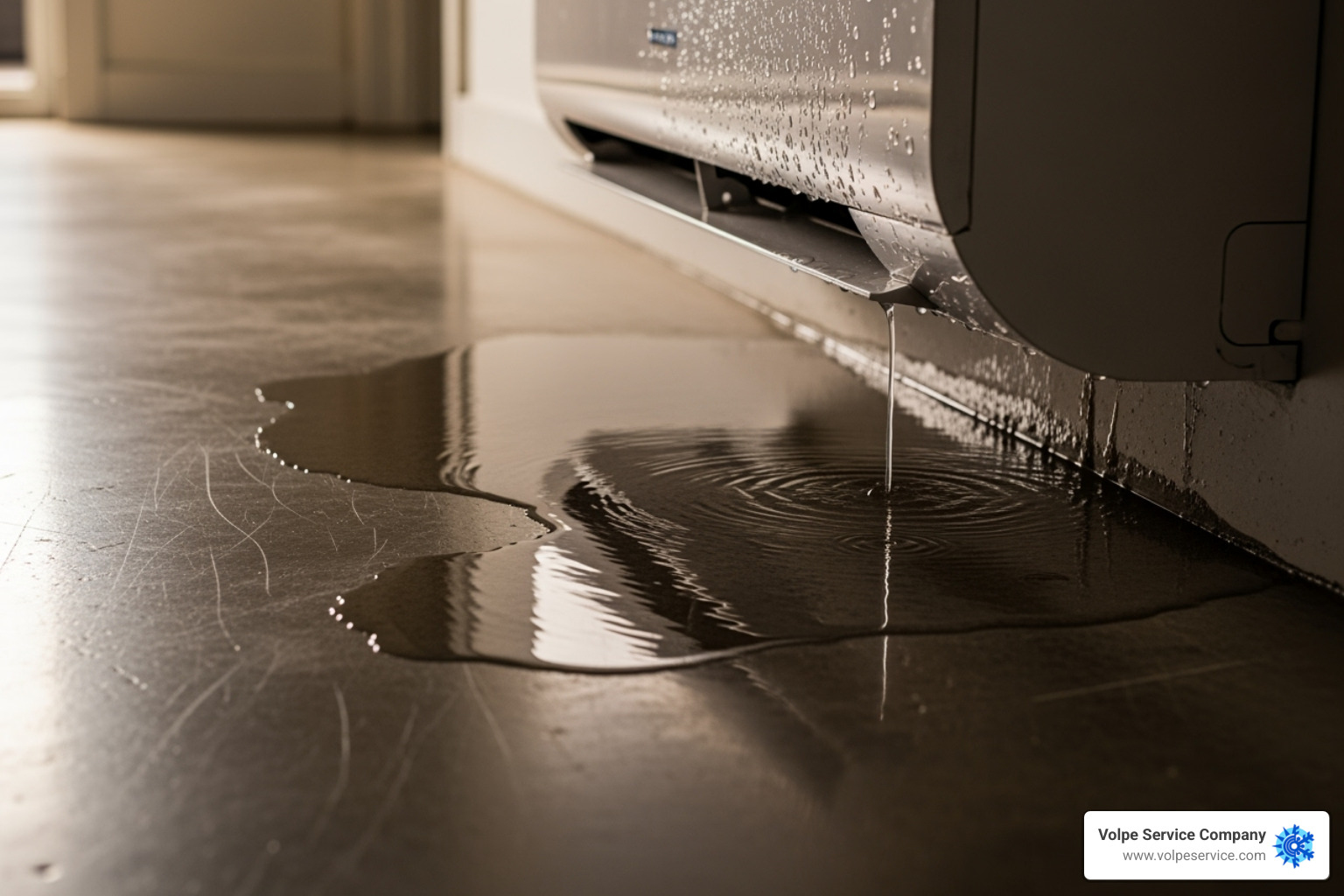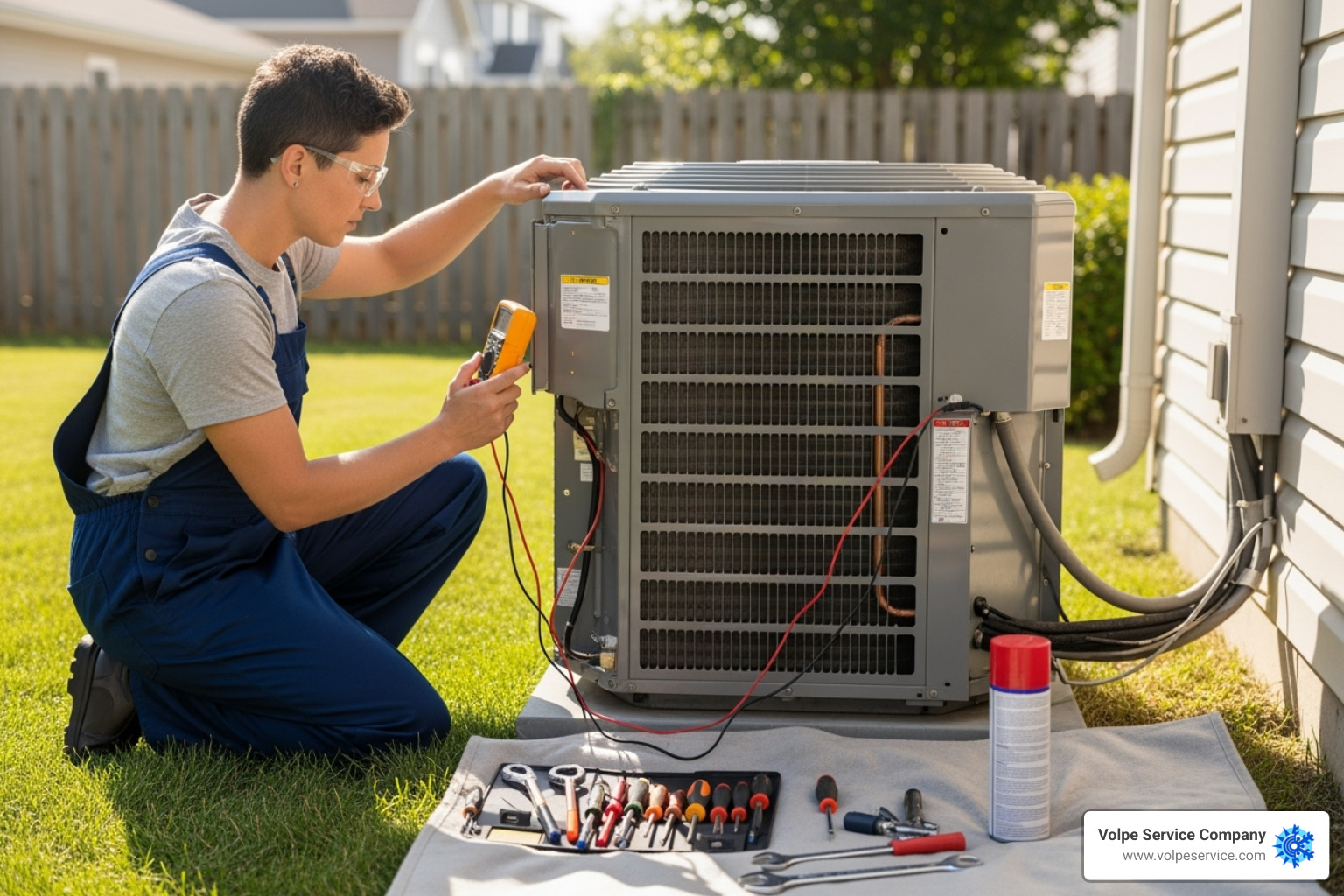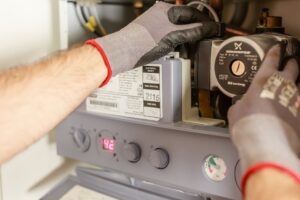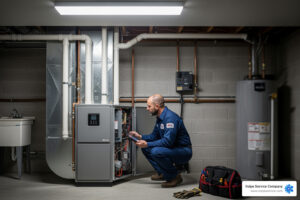Why Understanding Air Conditioning Issues Matters for Every Homeowner
Air conditioning issues can turn a comfortable home into an unbearable space during New Jersey’s sweltering summers. When your AC fails, understanding the potential cause can save you time, money, and frustration.
Most Common Air Conditioning Problems:
- AC won’t turn on – Often caused by tripped breakers, thermostat issues, or blown fuses.
- Running but not cooling – Usually dirty filters, low refrigerant, or dirty coils.
- Strange noises – Rattling or buzzing sounds indicate mechanical problems.
- Water leaks – Clogged drain lines or damaged condensate pumps.
- Ice buildup – Restricted airflow or refrigerant issues cause freezing.
- Unusual smells – Musty or burning odors signal different problems.
Many AC issues, like those from dirty air filters, stem from inadequate maintenance and can lead to premature compressor failure. The good news is that many common problems have straightforward solutions. This guide will help you distinguish between simple DIY fixes and issues like refrigerant leaks or electrical faults that require a professional for safety.
Decoding Common Air Conditioning Issues: From Power to Performance
When your AC unit acts up, the cause often lies in its core functions: turning on and cooling. Understanding these common power and performance problems can help you identify what your system is trying to tell you.
Why Won’t My AC Turn On?
If your air conditioner won’t turn on, check for these common culprits:
- Tripped Circuit Breaker: Your AC uses a lot of power, and an overload can trip the breaker as a safety measure. Check your home’s electrical panel first.
- Thermostat Settings or Batteries: Ensure your thermostat is set to “cool” with the temperature set below the current room temperature. Dead batteries in a digital thermostat can also prevent it from communicating with the AC.
- Faulty Capacitor: The capacitor provides the energy burst to start the motor. If it fails, you might hear a humming sound from the outdoor unit without the fan spinning. This is a common issue in older systems.
- Blown Fuse: A blown fuse, often in the disconnect box near your outdoor unit, will cut power to the AC.
- Condensate Overflow Switch: If the condensate drain line clogs, a safety switch may activate, shutting down the unit to prevent water damage.
While checking your breaker or thermostat is an easy DIY step, capacitor or fuse issues require a professional for safety.
My Air Conditioner is Running, But Not Cooling
If your AC runs but the air isn’t cold, it’s one of the most common air conditioning issues.
- Dirty Air Filter: A clogged filter is a top cause of AC problems. It restricts airflow, reduces efficiency, and harms indoor air quality. Check filters monthly and replace them every 1-3 months.
- Low Refrigerant: Refrigerant absorbs heat from your home. Low levels almost always mean there’s a leak, as refrigerant is not consumed like fuel.
- Dirty Evaporator Coils: Located inside, these coils absorb heat. A layer of dust or debris insulates them, preventing proper heat absorption.
- Dirty Condenser Coils: Located outside, these coils release heat. If covered in dirt or leaves, they can’t release heat effectively, making the AC struggle.
- Undersized AC Unit: If your AC runs constantly but can’t cool the home on hot days, it may be too small for the space.
Regular maintenance can prevent many of these issues, but refrigerant leaks or dirty coils require professional service.
Why is My AC Constantly Running or Short-Cycling?
An AC that runs constantly or “short-cycles” (turning on and off frequently) is inefficient, raises energy bills, and suffers premature wear.
- Incorrectly Sized Unit: An oversized unit cools too quickly and short-cycles. An undersized unit runs constantly, struggling to reach the target temperature.
- Thermostat Sensor Issues: If the thermostat is in direct sunlight or near a heat source, it will get false readings, causing the AC to run improperly.
- Clogged Air Filter: A clogged filter restricts airflow, forcing the system to run longer and less efficiently, leading to constant running or short-cycling.
- Refrigerant Leak: Low refrigerant forces the system to work overtime to cool your home, often resulting in constant, inefficient operation.
- Electrical Problems: Corroded wires or failing electrical controls can cause erratic behavior, including short-cycling.
Here are some signs your AC might be the wrong size for your home:
- High energy bills despite regular maintenance.
- Uneven cooling throughout your home.
- Consistently high indoor humidity levels.
- The unit constantly runs or short-cycles.
Sensory Clues: What Your AC is Trying to Tell You with Noises and Smells
Unusual sounds and odors can help diagnose specific air conditioning issues before they worsen.
Troubleshooting Strange AC Noises
Your AC should have a low, consistent hum. New or strange noises signal a problem.
- Rattling or Banging Noise: Indicates a loose part, such as a fan blade, or debris inside the unit.
- Grinding Noise: Often signals failing motor bearings. Turn the unit off and call a professional immediately to prevent severe motor damage.
- Buzzing Noise: Points to an electrical issue like loose wiring or a failing capacitor. This requires professional service.
- Squealing Sound: Usually caused by a worn or misaligned belt in older, belt-driven fan systems.
- Banging Sound: Can indicate a problem with the compressor or a loose internal component.
If you hear these noises, turn off your AC and contact us to prevent more extensive damage.
What are These Weird Smells Coming From My Vents?
Strange smells from your vents are a clear sign of air conditioning issues.
- Musty or Mildew Smell: Indicates mold or mildew in the condensate drain line or on the evaporator coil due to improper drainage and moisture buildup.
- Burning Smell: A serious sign of overheating mechanical or electrical parts. Turn off your AC immediately and call a professional.
- Electrical Odor: Indicates overheating wires, a failing motor, or a short circuit. This is a fire hazard that requires immediate professional attention.
- Rotten Egg Smell: This smell is typically associated with a natural gas leak. If you smell it, evacuate your home and call your gas provider immediately.
If you’re noticing unpleasant odors, we can help.
More info about our indoor air quality services
Visible Signs of Trouble: Leaks and Ice Buildup
Visible signs like water puddles or ice are clear indicators of air conditioning issues that need attention.
Why is My Air Conditioner Leaking Water?
If you find water leaking from your indoor AC unit, turn it off immediately to prevent water damage.
The most common cause is a clogged condensate drain line. As the AC removes humidity, water collects and drains outside. If this line is blocked by algae or debris, water backs up and overflows. A wet/dry vacuum can sometimes clear a minor clog, but professional help is often needed.
Other causes include a disconnected drain line due to vibrations or a cracked drain pan from age or damage. Units in basements or attics often use a condensate pump; if this pump fails, water will back up and leak.
Help! My AC Unit is Covered in Ice
Ice on your AC unit, even on a hot day, is a common sign of trouble. It often forms on the frozen evaporator coil inside your home. Running a frozen unit can destroy the compressor, the system’s most expensive part.
The most common cause is restricted airflow, usually from a dirty air filter. When warm air can’t flow over the cold coils, their temperature drops below freezing, and ice forms. Other causes include low refrigerant levels from a leak or a failing blower motor.
If you see ice, turn the system off and let it melt naturally. Do not chip it off. Running a frozen unit will cause more damage.
| Cause of Frozen AC Unit | Solution |
|---|---|
| Inadequate Airflow | Check/replace air filter, ensure vents are open and not blocked. |
| Dirty Air Filter | Replace the air filter regularly. |
| Damaged Blower Fan | Professional repair/replacement of the blower motor. |
| Blocked Condensate Line | Clear the drain line. |
| Dirty Evaporator Coil | Professional cleaning of the coil. |
| Insufficient Refrigerant | Professional leak detection and recharge. |
| Temperature-Related Causes | Adjust thermostat settings; ensure outdoor unit is appropriate for conditions. |
What are the Signs of a Refrigerant Leak?
Refrigerant circulates through the system to absorb heat. A leak disrupts this process, leading to a cascade of air conditioning issues.
- Hissing or gurgling sounds from your unit often indicate refrigerant escaping.
- Look for oily residue on the refrigerant lines (the copper pipes). Refrigerant contains oil that leaves stains when it leaks.
- The most obvious sign is poor cooling performance. Your home will take longer to cool or may not reach the set temperature.
- A system low on refrigerant works harder, leading to higher energy bills.
Refrigerant leaks are also an environmental hazard. Simply “topping off” the system doesn’t fix the leak. Professional leak detection and repair are required by law and for the health of your system.
According to the Department of Energy, inadequate maintenance can lead to many common AC problems, including refrigerant leaks.
Proactive Prevention: Your AC Maintenance Checklist
The best way to handle air conditioning issues is to prevent them. Proactive maintenance ensures your system runs efficiently, extends its lifespan, and saves you money.
Preventing Future Air Conditioning Issues with Regular Maintenance
- Clean or replace air filters regularly. A dirty filter restricts airflow, wastes energy, and causes premature wear. Check filters monthly and replace every 1-3 months, or more often if you have pets or allergies.
- Keep your outdoor condenser unit clear of leaves, grass, and debris. You can gently hose it down, but a deep cleaning is a job for a professional.
- Clear your condensate drain periodically to prevent clogs that cause water leaks and mold growth. A mixture of vinegar and water can help keep it clear.
- Visually inspect for ductwork leaks. Leaky ducts mean cool air isn’t getting where it needs to go, wasting energy. Sealing these often requires professional help.
- Schedule professional tune-ups twice a year (spring and fall). A technician will inspect connections, check refrigerant, clean coils, and lubricate parts to ensure peak efficiency and prevent future problems.
The Impact of Your Habits on AC Health
Your daily habits also affect your AC’s health and can help you avoid common air conditioning issues.
- Avoid closing vents in unused rooms. While it seems like it saves energy, it actually creates pressure imbalances that strain your AC, potentially causing damage. It’s best to keep all vents open for proper airflow.
- Proper thermostat placement is key. If it’s in direct sunlight or near a heat source (like a lamp), it will get inaccurate readings, causing the AC to run longer than needed and waste energy.
- Proper installation is critical for long-term reliability. An incorrectly sized or poorly installed unit will be plagued with issues from the start. Ensure your unit is installed by qualified technicians.
Frequently Asked Questions about Air Conditioning Issues
Dealing with air conditioning issues brings up many questions. Here are answers to the most common ones we’ve heard from New Jersey families since 1963.
How often should I change my air filter?
The general rule is every 1 to 3 months, but it depends on your home. With pets, change the filter monthly, as pet hair and dander clog it quickly. For households with allergies, a monthly change improves indoor air quality. Smoking or having a larger family also means more frequent changes are needed.
Pro tip: Check your filter monthly. If you can’t see light through it, it’s time for a new one.
Can I fix my air conditioner myself?
Some air conditioning issues are DIY-friendly, while others require a professional.
DIY tasks include changing filters, clearing debris from the outdoor unit, resetting a breaker, replacing thermostat batteries, and clearing minor drain clogs.
However, electrical work and anything involving refrigerant require a licensed professional. Handling refrigerant is dangerous and legally regulated. Safety first. When in doubt, call a professional to avoid injury or further damage to your system.
When should I repair versus replace my air conditioner?
Deciding whether to repair or replace is a tough decision. We consider several factors to give you honest advice.
- Age: Most systems last 10-15 years. If your unit is over 12 years old and needs a major repair, replacement is often the better financial choice.
- Frequency of repairs: If you’re calling for repairs multiple times a season, investing in a new system can be more economical.
- Cost: If a repair costs more than 50% of a new unit’s price, replacement is usually recommended. Also, consider the long-term savings on energy bills from a new, high-efficiency model.
A professional technician can provide a cost-benefit analysis to help you make the best decision for your budget and home.
When to Call the Professionals for Your AC
While some air conditioning issues are simple DIY fixes like changing a filter, many problems require professional expertise. Your AC is a complex system. For issues like electrical faults, refrigerant leaks, or major component failures (like a compressor), it’s crucial to call an expert.
Safety is paramount. Handling refrigerant and electrical components is dangerous without proper training and tools. Attempting complex repairs can lead to injury or further damage.
In New Jersey, Volpe Service Company has provided honest, professional HVAC service since 1963. We understand how critical a working AC is to your family’s comfort. Our certified technicians use a data-driven approach to find the root cause of your air conditioning issues, ensuring a correct and lasting repair.
Contact us for expert AC repair in Chester, NJ
When your AC fails, you need someone you can trust. As a family-owned business with deep roots in the New Jersey community, we understand that your home’s comfort is about peace of mind.
We stand behind every repair with our guaranteed service. We take the trust you place in us seriously.
Don’t let air conditioning issues ruin your summer. Our team is ready to restore your comfort and get your system running efficiently again.


